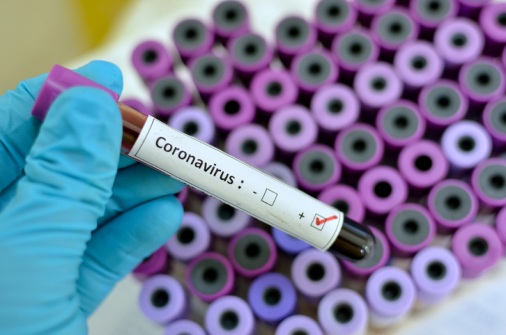Social Anthropologist Frédéric Keck discusses the Coronavirus

Frédéric Keck is director of research at France’s National Centre for Scientific Research (CNRS) and director of the Social Anthropology Laboratory. With funding from the AXA Research Fund, Keck also leads a team conducting the first study comparing social factors in different cultures and contexts that influence animal-human disease transmission. In this study, the team is exploring the frontiers between species: rather than an impermeable barrier, this is a zone where people interact with animals.
AXA XL's Fast Fast Forward team recently talked with Dr. Keck about the current coronavirus outbreak. This interview was conducted in late February as new outbreaks were being reported in Europe, Asia and the Middle East.
What are the similarities and differences between this and previous outbreaks?
This virus is very similar to the virus that caused SARS in 2003, in terms of the genetic sequence.
It’s more contagious than SARS, but it’s less lethal. The symptoms are typical of pneumonia and most of the people with severe or fatal cases also have other underlying health conditions. Also, it affects primarily elderly people; no children have died from the virus and very few children have been infected.
It also affects hospital staff who take care of the patients; that’s also similar to SARS.
What remains less clear is the period of incubation. According to the WHO, most experts believe this virus has an incubation period ranging from 1-14 days with an average around five days. That means the patients carrying the virus can circulate without symptoms. Which would explain the rapid spread in places like Italy and Iran.
With SARS, you really needed to be in close contact with the infected person’s excretions (droplets, faeces). This new coronavirus seems to spread more easily, and we so far have little knowledge about how it is aerosolized. That’s why it’s important for studies to be made about how long it survives on surfaces that people could come into contact with as they go about their lives. That also would explain why it’s more contagious than SARS.
This outbreak is a stern test of the global public health system. Although it’s still early days, how is it doing?
There was a success in early detection, but there was a failure in terms of control.
The challenge was to stop the spread at the beginning of the outbreak. Unfortunately, the warnings in early December about this new virus weren’t promptly heeded. And because of this delay in appreciating the seriousness of the virus, it has expanded. So now it’s global; it’s not a pandemic yet, but the fear is global.
Many people associate this outbreak with SARS and recall how the economy of Hong Kong was on the verge at the time. Had the SARS crisis lasted two or three months longer, Hong Kong’s economy would have collapsed. While not minimizing the human dimension, the focus was on the risks to the economy. So that’s why there has been an increase in investment in pandemic preparedness in many countries.
How should companies and individuals respond to this event?
It does make you think about the vulnerability of the global economy. We rely so much on connectedness, acceleration, circulation … And maybe a virus like this one, which should have very limited direct impact on people but could have disastrous economic consequences, will force people to slow down in some ways.
From a practical standpoint, one of the recommendations would be to avoid big meetings. Like Fashion Week in Paris where I’m based, and which ordinarily would draw many people from China. All the stakeholders from China cancelled their participation. So, organizers for big public events have to consider seriously the risk of cancellation.
As far as individual decisions about whether or not to travel, following the now well-publicized guidance about, e.g. hand washing and avoiding touching your face, should greatly limit the risks. Unless you have underlying health issues or are over 70 and already have respiratory troubles – although you should always comply with the guidelines of your respective government. The challenge is for the health authorities who have to control the emergence of a new virus.
How did you become interested in what you describe as “the frontiers between species”?
My initial interest was not about epidemics or pandemics but about food safety. I started working on this topic in 2005 at the time of the arrival of bird flu in Europe, so there was this fear of consuming chicken. Which was very similar to the fear of consuming beef after the emergence of CJD, also known as mad cow disease.
My work was not directly concerned with pandemics and the question of are we all going to die from a new virus … but I was interested in how we could have different ways of dealing with the animals we eat or live alongside. So that’s why I started working on measures to control bird flu and the complex relations between humans and birds in Hong Kong and China.
And then I realized that the influenza preparedness strategies implemented in Hong Kong, Singapore and Taiwan would not have worked if there had not been SARS, which was a major turning point. That’s when I started to think about the economic consequences of public health crises.
My interest is really in our changing relationship with animals because of climate change, deforestation, and industrial breeding. For example, one concern about coronavirus is that it is carried by bats. And bats are coming closer to human habitats because of deforestation. So, we also need to think not only about our relationships with China as an emerging power, but also with bats as reservoirs for viruses. Bats were imagined as medieval devils in the 19th century when many European nations saw massive migrations from rural areas to cities, but they are familiar neighbours in the countryside, and they are moving closer to urban areas because of deforestation. We now also realize we have much to learn about how bats manage to live with viruses, because bats have very good immune systems and they can share viruses in colonies much better than we do.
What is the current focus of your research?
I’ve just published a book called Avian Reservoirs – Virus Hunters and Birdwatchers in Chinese Sentinel Ports. After the SARS outbreak in 2003, Hong Kong, Singapore, and Taiwan invested in various techniques to mitigate future pandemics involving myriad cross-species interactions between humans and birds. In some places, microbiologists allied with veterinarians and birdwatchers to follow the mutations of flu viruses in birds and humans to create preparedness strategies. In others, public health officials killed thousands of birds in an attempt to prevent future pandemics.
In the book I make a comparative analysis of these responses, tracing how the anticipation of bird flu pandemics has changed relations between birds and humans in China. I also describe how these varied strategies for dealing with the threat of pandemics – stockpiling vaccines and samples in Taiwan, simulating pandemics in Singapore, and monitoring viruses and disease vectors in Hong Kong – reflect local geopolitical relations to mainland China. By outlining how interactions among pathogens, birds, and humans shape the way people imagine future pandemics, I try to show how interspecies relations are crucial for protecting against such threats.
Are there any other aspects of this current outbreak people should be aware of?
I think it’s important for opinion-makers and decision-makers to recognize that there will be other events like this one in the coming years. This is just the beginning. Because as soon as you start to trace new viruses when they emerge, you can have health crises like this one almost every five to ten years. The key will be learning how to better deal with these viruses globally to minimise the threat to human health, lives and economies.
Authored by AXA XL
About AXA XL
AXA XL is the P&C and specialty risk division of AXA which provides property, casualty, professional and speciality products to industrial, commercial and professional firms, insurance companies and other enterprises, here in the UK and throughout the world. With underwriting teams based in the US, UK, EMEA and Asia Pacific regions, we can make decisions close to the markets you serve and work with you to tailor cover to your business needs.
We help businesses adapt and thrive amidst change. Rather than just paying covered claims when things go wrong, we go beyond protection into prevention so your business can go beyond the unexpected.

